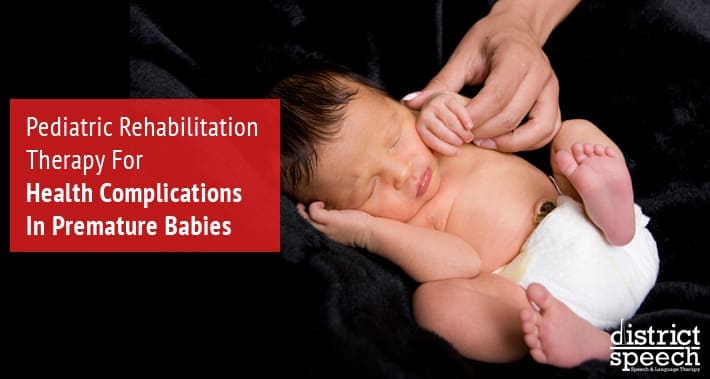
[ez-toc]
Most pregnancies last approximately 40 weeks.
Babies, however, can be unpredictable, and sometimes show themselves to the world a little earlier than planned.
The term for this is called a premature baby.
Unfortunately, when this happens it can lead to health complications.
These complications include an increase risk of disabilities including those related to speech.
Long term, babies born premature may struggle with reaching physical developmental milestones.
They may also fall short of their expected speech developmental milestones.
Here at District Speech, we’re a Washington DC speech pathologists clinic.
If your baby is born premature, pediatric physical therapy for premature babies can help promote growth and development.
As children grow older, they may need to take advantage of speech therapy for children as well.
Keep reading to find out more about the complications which could arise in premature infants, and how pediatric rehabilitation therapy can help.
What Is A Premature Baby?
A baby born at, or before 33 weeks of pregnancy is considered premature.
It could also be a baby that is born with a birth weight that is less than the norm.
This birth weight is typically a weight under 3 lbs 5 oz.
Premature infants have had less time to grow and develop than those who are brought to full term before being born.
This can bring a variety of health concerns, and complications with it.
These health complications can include breathing, respiratory, digestive, or heart issues.
There are a number of risk factors that increase the possibility of a baby being born premature.
It’s important to note that just the fact of being premature doesn’t guarantee your child will experience these complications.
If you have had a premature baby, however, it’s important to be aware of what to watch for.
If your child does start to show signs of developmental issues due to being born premature, it’s important to see a speech therapist or physical therapist.
Early intervention tends to show better results than the “wait and see” approach.
Common Health Complications With Premature Babies
There are a variety of complications which could come with premature infants.
Let’s have a closer look at a few of them, and how a physical therapist, or speech therapist can help with each.
Cerebral Palsy
Cerebral palsy is a group of disorders.
The word “cerebral” means having to do with the brain, and “palsy” means weakness.
The brain is the control center for speech, so those with cerebral palsy often have speech issues as well.
Cerebral palsy also impacts multiple other areas of the brain, which impact other bodily functions.
It affects muscle movement, coordination, tone, and balance, and is the most common cause of motor disabilities in childhood.
The muscles in your face and neck are often difficult to move and control when you have cerebral palsy.
Individuals with cerebral palsy often have trouble with coordinating gross motor skills, and developing their fine motor skills.
Some of the symptoms of cerebral palsy include:
- Delays in reaching milestones related to motor skills
- Neurological issues such as epilepsy, intellectual disabilities, and visual impairment
- Poor muscle tone
- Tremors
- Problems with swallowing
- Lack of coordination
- Trouble with hearing
There are 4 subtypes of cerebral palsy but the most common is spastic.
This causes issues with muscle stiffness and difficulty being able to learn to walk.
How Can Pediatric Physical Therapy Help?
Physical therapy can be very useful in treating cerebral palsy.
The treatment offered will be tailored to each individual, there is no “one size fits all approach”.
However, pediatric physical therapy for cerebral palsy will generally involve aspects which include the following elements:
- Play oriented exercises to help build strength and flexibility
- Massage
- Heat treatment
- Providing mobility aids designed to offer more independence
The goal of physical therapy for cerebral palsy will be to improve the following areas:
- Strength
- Balance
- Posture
- Coordination
- Endurance
- Pain management
- Flexibility
How Can Speech Therapy For Children Help?
Cerebral palsy has been linked with a number of different speech, language, and reading disorders.
This includes articulation disorders and as well as dysarthria.
A speech therapist may explore using bubbles, or the design drill to help provide treatment for your child’s speech disorder.
You can also use these activities at home to promote speech in your child, and aid in speech therapy treatment.
If your baby has been diagnosed with cerebral palsy, it’s a good idea to book your appointment with a speech therapist at District Speech as soon as possible.
This is because early intervention speech therapy treatments have been shown to have better results.
Speech therapy can help with improvement in communication, as those with cerebral palsy may often have social communication disorders.
One form of treatment for communication disorders is augmentative and alternative communication, or AAC
Speech therapy can also help by improving muscles involved in speech, and oral motor skills, and with eating, chewing and swallowing.
Speech therapy can also help your child to build their vocabulary, improve intonation, improve articulation, and increase speech volume if they have a weak voice.

Lack Of Muscle
Infants born prematurely may have a lack of muscle, decreased strength, or lowered muscle tone.
This is a result of not having the same amount of time to grow, and develop in the womb as infants who were brought to full term.
If not addressed, a lack of muscle can lead to issues with interacting with the environment, as well as delays in meeting developmental milestones for activities such as sitting, crawling, and walking.
How Can A Pediatric Physical Therapist Help?
A pediatric physical therapist can work with you, and your child in order to develop muscle, as well as:
- Encouraging movement
- Improving strength
- Reducing and preventing joint and muscle issues
- Using toys to encourage movement
- Increasing activity
All these activities help to promote the movement of your child to allow for their muscle to be strengthen, and make it more likely your child will be able to walk, and reach other developmental milestones.
Flat Head Syndrome
Flat head syndrome might be one of the most appropriately named disorders.
There are a few different types of flat head syndrome which you could encounter with a premature baby.
Plagiocephaly is when your baby’s head becomes flattened on the side, or back.
This generally occurs when a baby lacks the strength to move their head, and neck around, and ends up lying in the same position too much.
Scaphocephaly often occurs in premature babies who spend time in the neonatal ICU, as they are often positioned on one side for treatment.
Each of these disorders is more common in premature babies, according to a study by Ifflaender Et Al.
Although this is largely a cosmetic issue, it can lead to issues such as:
- Delayed intellectual development
- Difficulty focusing or ADHD
- Poor motor skills
- Impaired hearing, and vision
- Social anxiety and other mental health struggles
- Problems with balance
How Can A Pediatric Physical Therapist Help?
The primary approach often used for infants with flat head syndrome is education.
Parents and caregivers will need to learn how to position infants in ways which promote normal skull development.
This means playtime – but not sleep time – on the stomach to prevent pressure on the head, and discouraging the baby from favoring one side over the other.
A special helmet can also be used to help promote and redirect skull growth.
Reading And Learning Disabilities
As infants grow into toddlers, the effects of being born prematurely can have an impact on speech, and language development, as well as affect their ability to read and write.
RELATED: How To Teach Your Child To Write
Delays in the development of motor skills, and cognition can have an impact on reading development, and can lead to learning disabilities.
In addition, the risk of these sorts of complications increases greatly for infants who are considered very pre-term, or whose birth weight is under 3 pounds, 5 ounces.
Other than premature birth, reading and learning disabilities have a number of different causes, including:
- Down Syndrome
- Fetal alcohol syndrome
- Injury or illness during pregnancy, or early childhood
- Genetics
How Can A Speech Therapist Help?
If you are worried your child may not be learning to read at an appropriate rate for their age, or that they may be showing signs of a learning disability, speech and language therapy treatments for learning and reading disabilities can help.
They will provide supports to help ensure your child has the optimal environment required for learning language and developing your child’s reading skills.
Intervening early, as the brain is forming new pathways, is critical.
These interventions would include approaches meant to target cognitive, speech, language, and social abilities.
Feeding And Swallowing Issues
Premature babies are more likely to need speech therapy for feeding and swallowing disorders due to their digestive systems not being fully developed.
Additionally, issues with lack of muscle tone may make sucking more difficult.
Some signs of issues related to feeding and swallowing include:
- Being fussy while feeding
- Difficulty with chest, or breast feeding
- Problems breathing while feeding
- Coughing, and gagging at mealtime
- Not gaining weight at an appropriate rate for their age
How Can A Speech Therapist Help?
A speech therapist will watch how your child uses their mouth, including their teeth, and their tongue, and may run some tests to determine more precisely the root of the issue.
A speech therapist will often work as part of a larger team to help treat issues relating to feeding and swallowing.
Solutions may include, but are not limited to:
- Evaluating your child for autism
- Cleft lip and cleft palate speech therapy
- Tongue tie speech therapy
- Tongue thrust speech therapy treatment
This team may include nurses, doctors, lactation consultants, physical therapists, dieticians or nutritionists, and other health professionals invested in the health and wellness of your baby.
A speech therapist can help specifically with:
- Exercises to strengthen the muscles of the mouth
- Getting them to try different types of food or drink
- Assisting with sensory issues, related to food texture, temperature or being overly sensitive to certain sounds
- Helping them move their tongue more while eating
- Helping babies learn how to breathe better while eating or drinking
Book Your Appointment With District Speech Today
Are you worried about the developmental issues which could affect your premature baby?
Perhaps you’re already noticing signs of muscle weakness, flat head syndrome, or feeding issues in your little bundle of joy.
Thankfully, District Speech can help.
Book your appointment with District Speech today.
1300 I St NW, Suite 400 E,
Washington, DC 20005
- https://g.page/districtspeech
District Speech and Language Therapy specializes in speech therapy, physical therapy, and occupational therapy solutions, for both children and adults, in the Washington D.C and the Arlington Virginia areas.